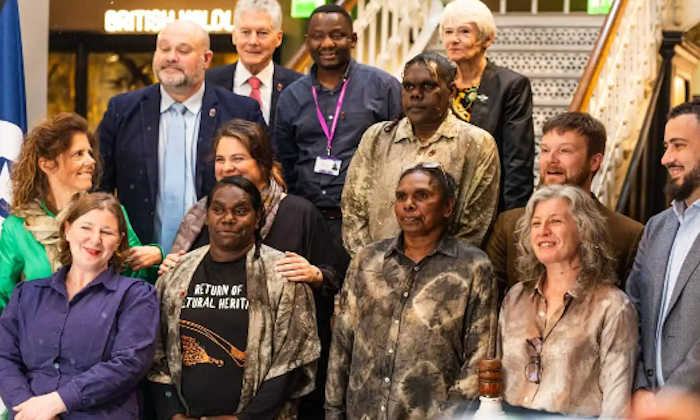Manchester Museum returns Aboriginal artefacts in special ceremony
07 Sep 2023
On Tuesday, 5 September 2023, a delegation from the Aboriginal Anindilyakwa community of Groote Eylandt joined colleagues at Manchester Museum for the formal return of 174 cultural heritage items

Building greater understanding between cultures is central to Manchester Museum's mission. As part of this, we’re committed to the unconditional return of collections and belongings to communities of origin. These actions are an important way of building a more equitable and hopeful future for museums.
Manchester Museum worked collaboratively with the Australian Institute of Aboriginal and Torres Strait Islander Studies (AIATSIS) and the Anindilyakwa Land Council over a three-year period to determine where these items should live and could best inspire future generations. For the first time, Manchester Museum staff were present in person for part of the consultation process, visiting Groote Eylandt, in Australia’s Northern Territory at the invitation of the Anindilyakwa People.
The return of these items is already supporting Anindilyakwa cultural strengthening and revitalisation, with descendant generations using the items to connect with their heritage.
Thomas Amagula, Deputy Chair of the Anindilyakwa Land Council, said: “The Anindilyakwa Land Council represents the 14 clans who are the Traditional Owners of the land and seas of the Groote Archipelago, and the repatriation of the Worsley Collection by Manchester Museum is an important step for the ALC in pursuing one of our core visions: to ‘protect, maintain, and promote Anindilyakwa culture’. We have only just begun to appreciate how valuable the repatriation of the Worsley Collection will be in the future.”
Georgina Young, head of exhibitions and collections at Manchester Museum, said the handover felt "momentous" in a different way to any past returns.
"Sitting with Elders and hearing them discuss this collection on their land in their terms has enabled me to understand and care in ways not possible in a store room in Manchester, and brought us to a place of understanding together," she said.
"We are excited by all that this return makes possible in terms of future partnership, but more so by how it supports Anindilyakwa cultural strengthening for years to come."
Manchester Museum has collaborated with AIATSIS over the past five years and previously returned sacred and ceremonial items to Aboriginal communities. The current repatriation goes further, embracing the full scope of the United Nations Declaration on the Rights of Indigenous Peoples by returning material beyond the secret, sacred and ceremonial that is important to the traditions and memories of the Aboriginal community that made them.
It follows in a 20-year history of returning items to Indigenous communities and is guided by Manchester Museum’s values of inclusivity, imagination and care, underpinned by the University of Manchester’s own commitment to social responsibility. The aim is to reimagine the role of museums by shifting emphasis toward caring for people as well as objects, building greater understanding and empathy between cultures by working with communities to tell their stories in different ways.
- You can read more about this on the Manchester Museum website.
